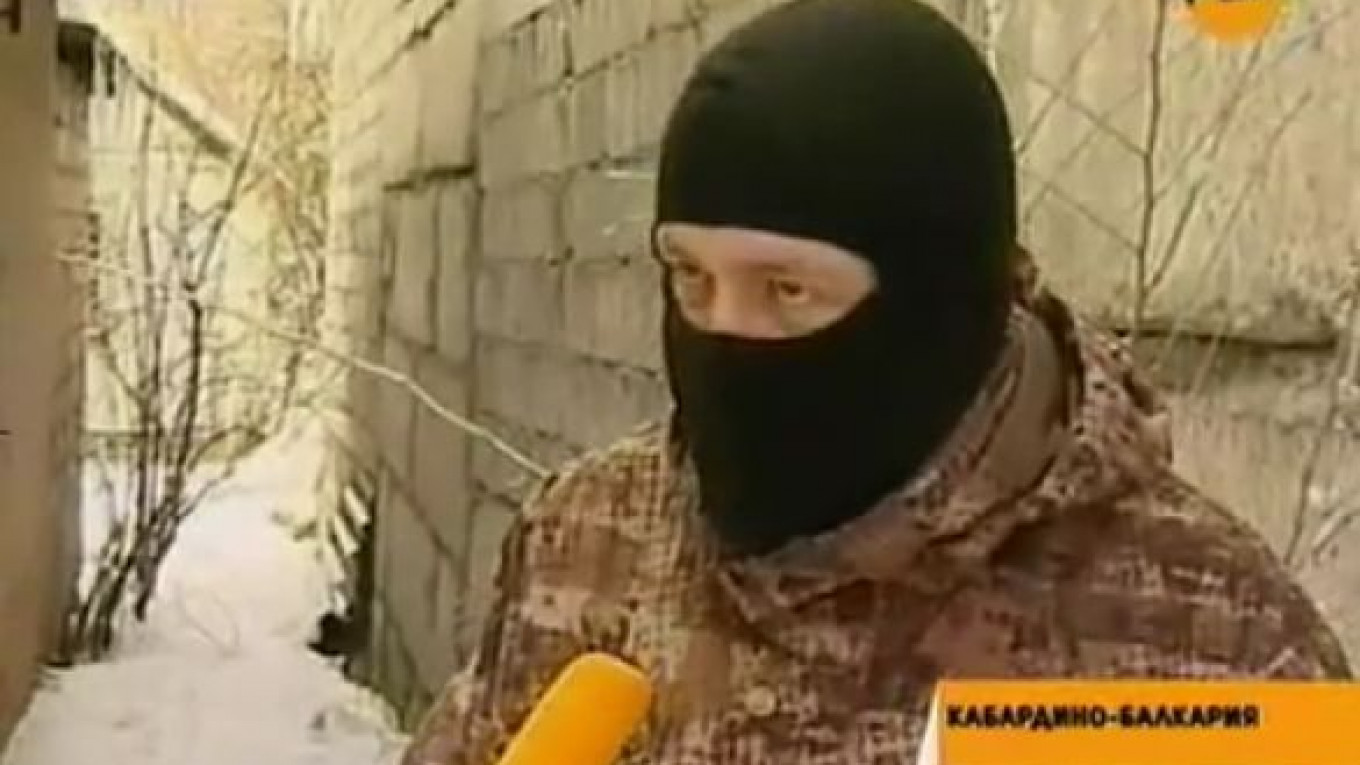Raising the specter of a new wave of violence, ordinary people weary of bloodshed in the North Caucasus have threatened to take up arms themselves to kill militants and their families.
The grass-roots vigilantes have formed a group called the Black Hawks that opposes Wahhabism, a radical form of Islam favored by militants. Based in Kabardino-Balkaria, the group is vowing to restore calm in the mountainous republic beset by a series of recent attacks, including the murder of three Moscow tourists at a ski resort.
"If they continue, we will kill their children," a masked man who identified himself as a Black Hawks member said in an interview with Ren-TV. "We'll give them a taste of their own medicine so they know how painful it is."
Locals are tired of bombings and killings and intend to respond in kind, said the man, whose face was shrouded by a black balaclava and voice was modified.
"They can collect money from tough businessmen, vodka magnates and the like, but they cannot kill our children," he said in the interview aired late Tuesday.
Militants are known for exhorting money from entrepreneurs.
The Black Hawks are a vigilante group made of "ordinary republican residents" — mostly relatives of slain police officers — who are willing to fight the "forest brothers," the man said.
He added that families of insurgents would be targeted because most of them were aware that their relatives were fighting with the militants — usually for the money, not their faith.
The Black Hawks first announced their intentions through a series of online videos released last month. The videos were accompanied by several attacks against the relatives of suspected terrorists in Kabardino-Balkaria.
One attack saw unidentified men throw Molotov cocktails in a yard in Nalchik, the regional capital, belonging to relatives of Astemir Mamishev, whom investigators have linked to several killings and who is currently on the run, local news web site Kavkazsky Uzel reported. No injuries were reported. A written threat signed by the Black Hawks was found nearby.
Later in February, grenades went off near houses owned by the families of Mamyshev and another suspected militant accused of murder, Aznaparukh Samayev. No group took credit for the attacks, in which no one was hurt.
North Caucasus militants claimed Wednesday on their Kavkaz Center web site that the Black Hawks actually consist of law enforcement officers looking to terrorize the "mujahedin."
The web site provided no proof, but the practice is not unheard of. The authorities reportedly have detained family members of suspected militants in the past to pressure their loved ones to surrender.
Still, security analyst Andrei Soldatov expressed doubt that the Federal Security Service was behind the Black Hawks, saying, "The FSB simply doesn't like creating informal organizations."
But the Black Hawks may believe they have the backing of officials because their emergence coincided with a call by Kabardino-Balkaria leader Arsen Kanokov last month to establish "an armed people's militia" to make the republic safer.
"It's possible that those people think that they have support," Soldatov, who heads the Agentura.ru web site, said by telephone.
Kabardino-Balkaria has enjoyed relative calm over the past two decades, but things have gone downhill in recent months with a string of attacks that indicate North Caucasus militants may have shifted their focus to the republic.
Islamist militants dealt serious blows to both the republic's tourist industry and law enforcement infrastructure in February. Three tourists from Moscow were gunned down in the vicinity of Mount Elbrus, and a cable-car support pole was blown up in the area. In Nalchik, the FSB headquarters, an FSB-owned sanatorium and traffic police checkpoints were attacked.
Kanokov said last month that the number of local attacks on law enforcement officers had soared four times year on year, and Interior Minister Rashid Nurgaliyev said in November that the number of terrorism-related crimes in the region had quintupled.
Neither official gave specific numbers, but Kavkazsky Uzel reported 41 explosions and one suicide bombing in Kabardino-Balkaria last year, compared with 12 explosions and no suicide bombings in 2009.
By comparison, Dagestan, the region's most turbulent republic, saw 112 explosions and six suicide bombings in 2010, an increase from 69 and one in 2009. In Chechnya, the number of attacks dropped from 62 to 39 explosions, although there were four suicide bombings last year compared with one in 2009.
A Message from The Moscow Times:
Dear readers,
We are facing unprecedented challenges. Russia's Prosecutor General's Office has designated The Moscow Times as an "undesirable" organization, criminalizing our work and putting our staff at risk of prosecution. This follows our earlier unjust labeling as a "foreign agent."
These actions are direct attempts to silence independent journalism in Russia. The authorities claim our work "discredits the decisions of the Russian leadership." We see things differently: we strive to provide accurate, unbiased reporting on Russia.
We, the journalists of The Moscow Times, refuse to be silenced. But to continue our work, we need your help.
Your support, no matter how small, makes a world of difference. If you can, please support us monthly starting from just $2. It's quick to set up, and every contribution makes a significant impact.
By supporting The Moscow Times, you're defending open, independent journalism in the face of repression. Thank you for standing with us.
Remind me later.






